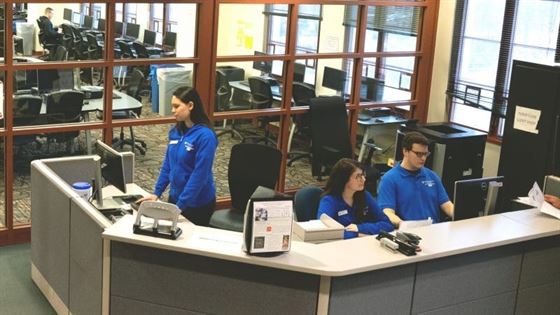Upon graduating and searching for a job, do not worry if the salary you once hoped for is not in the books. By the time 2024 comes, flipping burgers will guarantee you $15 an hour, according to Gov. Phil Murphy and New Jersey legislative leaders who came up with a deal back in January of this year.
Minimum wage, which is currently $8.85 per hour, will be raised by a dollar over the course of the next five years, joining California, Massachusetts and New York as a few of the progressive states regarding wages. In July, the minimum wage will increase to $10 per hour, helping many individuals, but increasing the potential to also hurt others and their businesses.
According to The New York Times, there has been an emerging prevalence of unwarranted firings after their minimum wage was set to increase.
Twenty-year-old junior psychology major Mia Albert works at a movie theater and agrees that there are consequences to the new law.

Student employees pose with textbooks at Montclair State’s bookstore. Photo courtesy of Montclair State University
“From my perspective, I think minimum wage needs to be increased, but going to $15 is unrealistic,” Albert said. “If it increases, some people might lose their jobs because businesses might not want a lot of employees on their payroll. Especially if they are going to have to pay them $15 per hour.”
Many are concerned that small businesses may pass college students’ resumes who are looking to make some extra money. Those small businesses may struggle to hire a part-timer due to the new law, making an easy side job a thing of the past.
Currently, Montclair State University’s student workers are paid a minimum of $8.85 per hour, with many departments planning gradual increases over the next year. It’s unclear what effect this new pay rate increase will pose for on-campus employment.
Nick Ramos, a junior working in the information technology department at Montclair State, has mixed feelings on the minimum wage topic and is concerned about the potential for raises amidst a pay rate hike.

Students who work at the IT Service Desk greet visitors and address technology issues. Photo courtesy of Montclair State University
“I am still waiting for my raise,” Ramos said. “Every year [we] are evaluated for a raise, so this law could be affecting it.”
A senior working at the campus bookstore, Joshua Cohen, is expecting to graduate in May and worries about educational value.
“It is very simple, at a certain point we need to stop having minimum wage increase or else inflation will rise,” Cohen said. “The value of an education will decrease because you can make just as much money without a degree [while] working a minimum wage job.”
Leaving politics out, it is extremely tough to support oneself and a family on a minimum wage job if one does not have the opportunity to attend college. Many believe any individual who works hard at a full-time job should not struggle entirely and should not have to worry where their next meal is coming from.
Gov. Murphy claims that on top of helping low-income families, the new law can boost work ethic and the economy.

A graph shows the projected transition to the $15 minimum wage over the next decade. Graphic courtesy of NJ.gov
“For far too long, too many of our fellow New Jerseyans have been struggling to survive on wages that have not kept up with the cost of living,” Murphy said. “I am incredibly proud to sign legislation that raises the minimum wage to $15 per hour, ensuring that the most vulnerable among us will have the means to put food on the table while growing our economy and addressing priorities of the small business community.”
Junior Hannah Salvaryn, who works on campus in the Summer Orientation Leadership Program, agrees that students and New Jersey workers should be paid more.
“Although we don’t get paid hourly, we do get to dorm in The Village during the summer when we mentor incoming freshman,” Salvaryn said. “It is sometimes draining and we should be paid more.”
Salvaryn shared that the new law seems hopeful, and she is encouraged by its predicted boost to income for over one million New Jersey residents.
“There are a lot of people that need more,” Salvaryn said. “They are providing for their families.”



